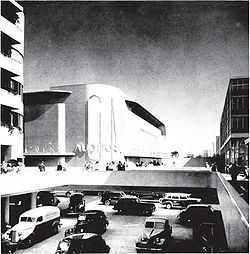- Norman Bel Geddes
-
Norman Melancton Bel Geddes (April 27, 1893 – May 9, 1958) was an American theatrical and industrial designer who focused on aerodynamics.[1]
Bel Geddes was born Norman Melancton Geddes in Adrian, Michigan, and raised in New Philadelphia, Ohio, the son of Flora Luelle (née Yingling) and Clifton T. Geddes, a stockbroker.[2] When he married a woman named Helen Belle Schneider in 1916, they incorporated their names to Bel Geddes. Their daughter was actress Barbara Bel Geddes.
He began his career with set designs for Aline Barnsdall's Los Angeles Little Theater in the 1916-1917 season, then in 1918 as the scene designer for the Metropolitan Opera in New York. He designed and directed various theatrical works,[3] from Arabesque and The Five O'Clock Girl on Broadway to an ice show entitled It Happened on Ice produced by Sonja Henie. He created set designs for the film Feet of Clay (1924), directed by Cecil B. DeMille, designed costumes for Max Reinhardt, and created the sets for the Broadway production of Sidney Kingsley's Dead End (1935).
 A street intersection in the City of the Future. Detail of the Futurama exhibit at the 1939 New York World's Fair.
A street intersection in the City of the Future. Detail of the Futurama exhibit at the 1939 New York World's Fair.
Bel Geddes opened an industrial-design studio in 1927, and designed a wide range of commercial products, from cocktail shakers to commemorative medallions to radio cabinets. His designs extended to unrealized futuristic concepts: a teardrop-shaped automobile, and an Art Deco House of Tomorrow.[4] In 1929, he designed "Airliner Number 4," a 9-deck amphibian airliner that incorporated areas for deck-games, an orchestra, a gymnasium, a solarium, and two airplane hangars.[5]
Bel Geddes's book Horizons (1932) had a significant impact: "By popularizing streamlining when only a few engineers were considering its functional use, he made possible the design style of the thirties."[6] He wrote forward-looking articles for popular American periodicals.[7][8]
Bel Geddes designed the General Motors Pavilion, known as Futurama, for the 1939 New York World's Fair. For that famous and enormously influential installation, Bel Geddes exploited his earlier work in the same vein: he had designed a "Metropolis City of 1960" in 1936.[9]
Bel Geddes's book Magic Motorways (1940) promoted advances in highway design and transportation, foreshadowing the Interstate Highway System ("there should be no more reason for a motorist who is passing through a city to slow down than there is for an airplane which is passing over it"). His autobiography, Miracle in the Evening, was published posthumously in 1960.
"Norman," written by Gerry Beckley of the band America and performed by Jeff Larson on his 2002 album Fragile Sunrise, is an homage to Bel Geddes.
The case for the Mark I computer was designed by Norman Bel Geddes. IBM's Thomas Watson presented it to Harvard. At the time, some saw it as a waste of resources, since computing power was in high demand during this part of World War II and those funds could have been used to build additional equipment.
The United States Postal Service celebrated the First-Day-Of-Issue for a commemorative U.S. postage stamp honoring Bel Geddes as a "Pioneer Of American Industrial Design" on June 29, 2011 at the Cooper-Hewitt National Design Museum in NYC. [10]
References
- ^ Donald H. Dyal, Norman Bel Geddes: Designer of the Future, Monticello, IL, Vance Bibliographies, 1983.
- ^ The Midwestern Roots of Barbara Bel Geddes
- ^ Bernhard Russell Works, Norman Bel Geddes: Man of Ideas, Madison, WI, University of Wisconsin Press, 1966.
- ^ Adrian Tinniswood, The Art Deco House, New York, Watson-Guptill, 2002; p. 20.
- ^ http://flyawaysimulation.com/article3322.html
- ^ Jeffrey L. Meikle, Twentieth Century Limited: Industrial Design in America, 1925–1939, Philadelphia, PA, Temple University Press, 2001; p.48.
- ^ Norman Bel Geddes, "Streamlining," Atlantic Monthly, November 1934; pp. 553-8.
- ^ Norman Bel Geddes, "Ten Years From Now," The Ladies' Home Journal, January 1931; p. 190.
- ^ Peter M. Wolf, The Future of the City: New Directions in Urban Planning, New York, Watson-Guptill, 1974; p. 28.
- ^ Computer Oral History Collection, 1969-1973, 1977 Grace Murray Hopper Interview, January 7, 1969, Archives Center, National Museum of American History [1]
External links
- Documentation of "Highways and Horizons"
- "To New Horizons" - a video document recording the display at the 1939/40 World's Fair (from Prelinger archives)
- Magic Motorways, by Norman Bel Geddes (from Prelinger Library)
- Horizons, by Norman Bel Geddes (from Prelinger Library)
- IDSA-Los Angeles, More about Norman Bel Geddes
- A Fine Road Not Taken (provides details of Airliner Number 4)
- Norman Bel Geddes Collection at the Harry Ransom Center at the University of Texas at Austin
Categories:- 1893 births
- 1958 deaths
- American architects
- American designers
- American industrial designers
- People from Adrian, Michigan
Wikimedia Foundation. 2010.


